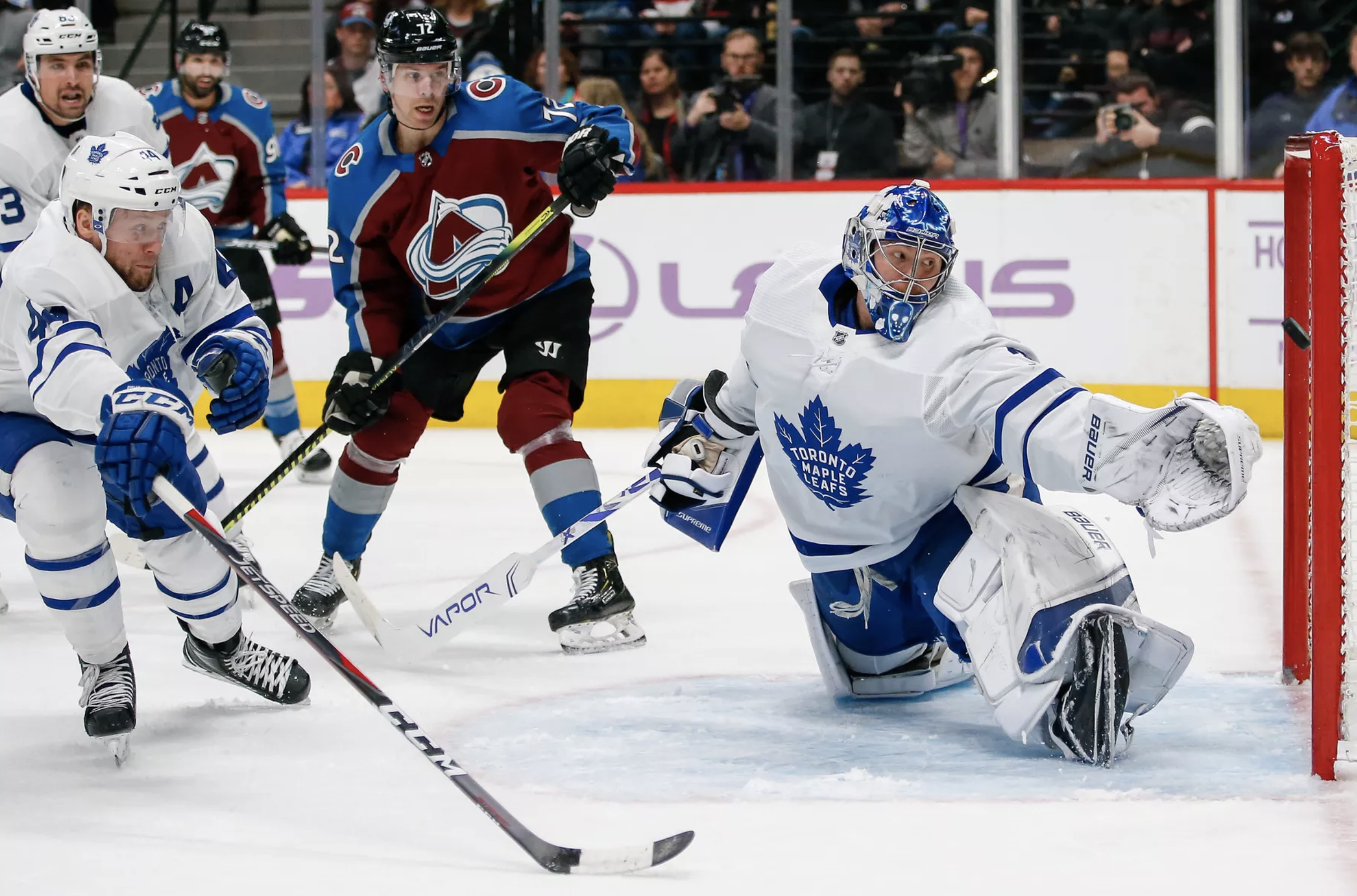The Toronto Maple Leafs are 2-0-0 in the Sheldon Keefe era after a four-goal outburst in the first period proved enough despite taking on water in the final 40 minutes versus Colorado on Saturday night.
Your game in ten:
1. This game played out like a typical Leafs win from before they forgot how to score for a while. They didn’t start well, turned it on for about 10-15 minutes and scored four times, and then held on, leaning on their luck and Frederik Andersen to keep a multi-goal lead from withering away. The offense was back in full force — it’s been a while since they’ve chased a goaltender like that, which is a nice confidence booster — but the ability to lock down a game with sound defense remains the question mark.
Finishing this chapter of the road trip off with a win and getting the team back above .500 is the important part, but there is plenty to work on here for Sheldon Keefe. This game was several goalposts, some big Andersen saves, or a Cody Ceci shot block away from a full Leaf collapse. That said, there was a lot to like in the second half of the first — as well as a segment of the third where they tightened up for a spell, counterpunched effectively, and could’ve put the game away — and it’s something to build on.
2. This might not be a popular point given Tyson Barrie deserves praise for breaking through offensively with two goals and three points in these last two games, but here goes. It was the Barrie/Kerfoot return to Colorado, so it seems like a worthwhile time to (prematurely) revisit the deal.
Nice pass by Nylander to Barrie for his first PP goal of the year. 3-1 Leafs. #LeafsForever pic.twitter.com/fs1uL2gHsA
— Maple Leafs Hotstove (@LeafsNews) November 24, 2019
To start the year, Mike Babcock basically went, “We’re playing Tyson Barre on our second pair for 20-22 minutes a night, second PP, and he’s a veteran who should be able to sort it out.” Not a crazy assumption/expectation, but Babcock was pretty ruthless about not throwing him a lifeline during his tough start, keeping him off the top PP unit to the point where it was really controversial in the market and probably among the players on the team. Babcock likely remembered Jake Gardiner was in the exact same spot on this team (second pair + second PP behind Rielly) and always handled it well by driving play for the team with quality 5v5 minutes.
Sheldon Keefe wants to put Barrie in a position to succeed by using him where he’s always been strongest (first-unit PP), and so far at 5v5, he’s been on the bottom pairing next to Travis Dermott. He played 13 minutes at even strength tonight — a result of the fact that the team was protecting the lead for much of the game.
We’ll see what happens here. If Barrie gets his mojo back, they move him back up, and he does well in the top four playing relatively tough minutes, it would be a big benefit to the team. If he’s a sheltered 5v5 guy who can help on the PP, that has value (especially if it helps revive an under-performing power-play), but it would be seriously worth questioning if it was worth giving up all that Kadri brought at 5v5 and the power play for this team — on such a good contract, too — for one year of Barrie plus Kerfoot.
You could diminish Kadri’s value if you want and say he was just a 3C in Toronto, but under a more creative coach than Babcock in terms of line flexibility, they could do what Jared Bednar does in Colorado, which is move Kadri up next to an elite center on the LW. That would have given the Leafs a really nice element they don’t currently have in their top six. We never saw the full value of Kadri on this team once John Tavares was added because Babcock was so rigid about keeping him in the 3C role in all situations except the occasional post-PK shift. Kadri – Tavares – Hyman would’ve been an awesome line that could play matchup minutes and be a total pain in the ass for the opposition, for instance.
I’m still very much undecided on this deal. The Leafs’ right side would be dire without Barrie, sure, but addressing it elsewhere with maybe a lower-profile defenseman who defends better and keeping Kadri is an interesting question to weigh up. Anyway, we’ll stop prematurely analyzing and continue to watch this play out.
3. The most notable differences I’m seeing under Sheldon Keefe so far:
- Some more fluidity in terms of the movement and rotations in the o-zone, with forwards rotating up high (e.g. Matthews goal) and D shooting down the walls / darting into spaces more aggressively coming in off the blue line. This creates more conscious efforts to get open and presents options for each other in the offensive zone, and it’s sowed more of the organized chaos the Leafs are looking to create in the o-zone in the last couple of games.
- More frequently patient on the breakout and with reloads in the neutral zone instead of advancing pucks quickly — in line with the “we’re skilled, so keep the puck” philosophy preached by Keefe/Dubas. They seem more content to regroup and work a hinge play if need be.
- Bringing more support low in the defensive zone, playing a little more compact in supporting the defense more below the hashmarks — once in the defensive-zone coming back, forwards are retreating more to the middle, and flaring out from there.
Instead of dumping it in, Hyman turns back to help start a breakout. This leads to a great scoring chance for Nylander. #LeafsForever pic.twitter.com/oIjxmF6mtV
— Maple Leafs Hotstove (@LeafsNews) November 24, 2019
The Leafs do a great job hanging onto the puck in their own end before waiting for the lane to open up. #LeafsForever pic.twitter.com/ToQ9TG8gRK
— Maple Leafs Hotstove (@LeafsNews) November 24, 2019
It’s not that the Leafs never did some of the above under Babcock, but those seem to be the points of added emphasis.
4. One area that obviously remains a major work in progress is the Leafs penalty kill. There have been a number of goals this year where the Leafs defensemen are pushing up the zone and leaving forwards completely alone — that, or stranding one defensemen in a situation where he’s outnumbered and needs to make a play to cut out the cross-crease pass while and preventing the puck carrier from walking out in front.
Against Arizona, on the first power play of the game, the Leafs D pushed way up the ice off the initial faceoff and somehow left a 2-on-0 against Andersen.
You might remember the goal against Philadelphia earlier this month where Ceci abandoned his post with the puck down low and tried to cover off a one-time option in the slot, leading to a short-side goal by Claude Giroux. A kind-of-similar situation played out prior to the 4-2 goal tonight:
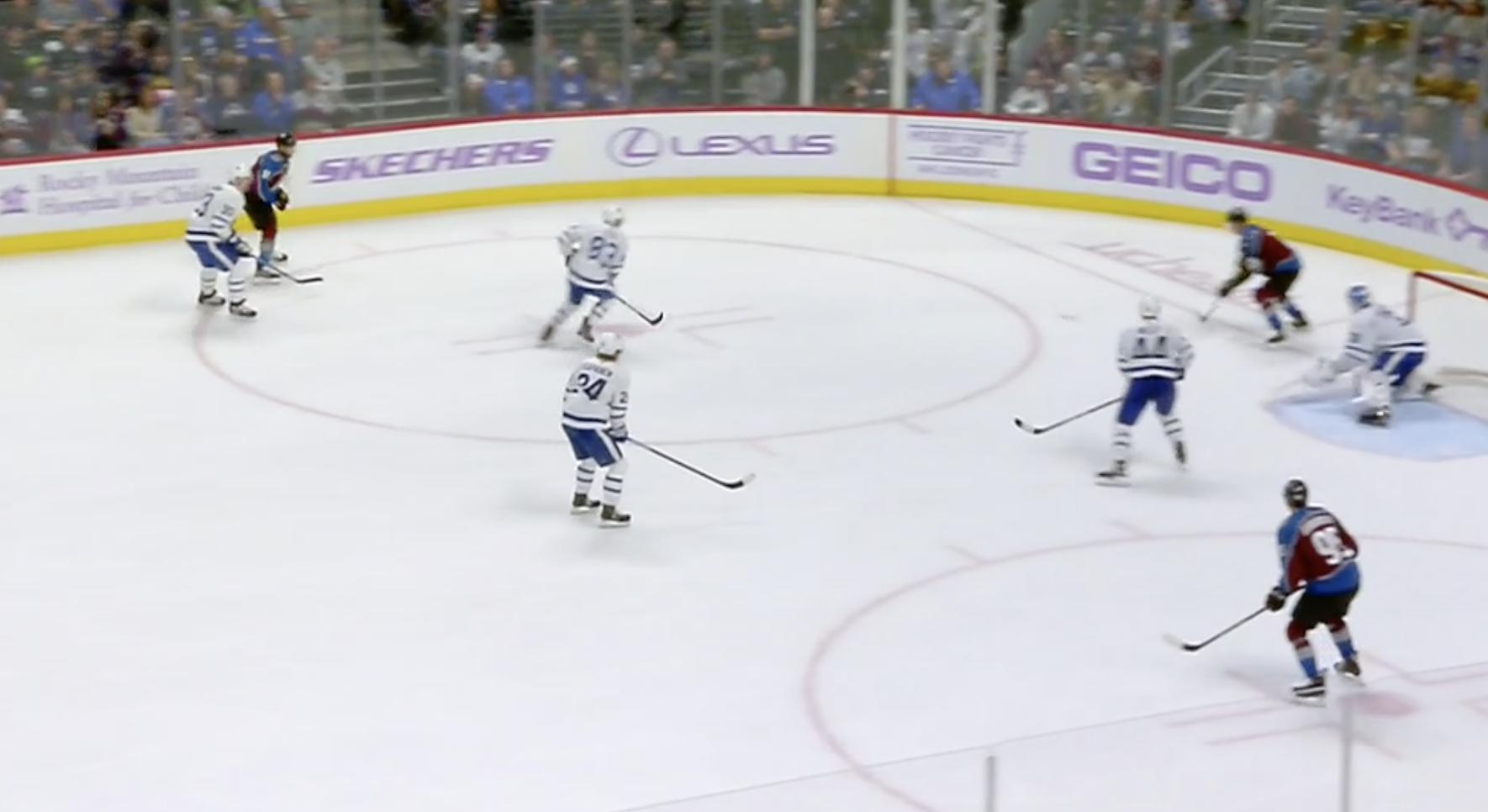
Rather than setting up for the one-T play in the slot, MacKinnon looped around and trailed the play, looking to get lost in coverage as a late-comer. When Kadri sent it down low, Rielly was stranded and it ended up in the back of the net at the back post. Ceci (somewhat in his defense, he had just blocked a shot and was wincing in pain) ended up in no-man’s land with a huge gap to cover.
5. Two different scenarios played out just prior that were too easy for the Avs. One was MacKinnon driving through the space in behind Ceci (again) and nearly sliding one through Andersen in front. Another was a one-timer for MacKinnon from the slot.
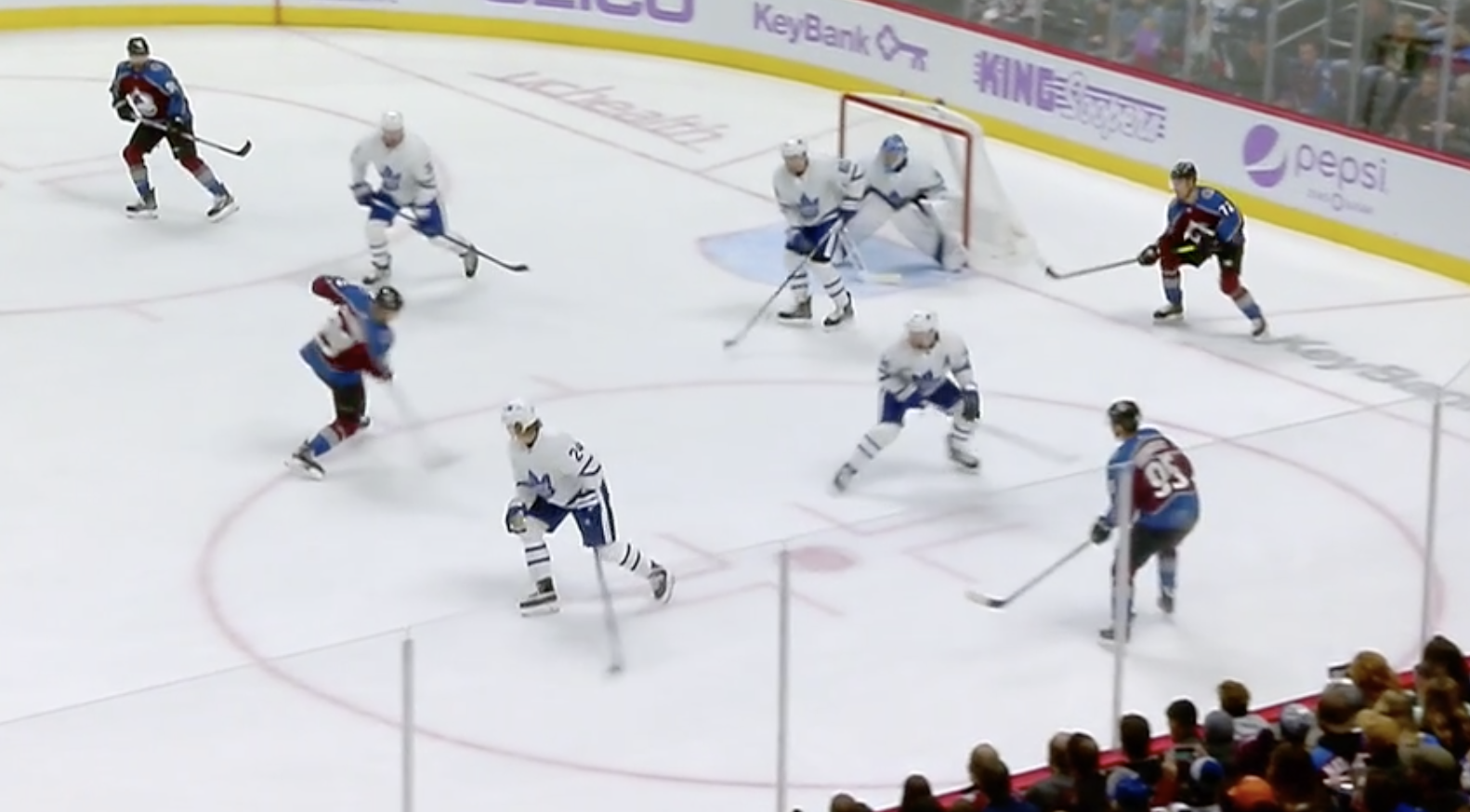
You could see Rielly was in between, looking to get a stick in the lane for the one-timer while looking over his shoulder in case he needed to retreat down low should the puck be kicked down there. Kapanen turned his back on the puck briefly, guessing on a pass to the point, and it could’ve been deadly.
Kapanen can be a lethal weapon picking off passes/stumbles at the point or releasing for shorthanded breakaways, but he always has and continues to struggle with coverage in the zone on the PK.
Overall, the units appear confused by the scheme, they’re not synced up, and they’re getting worked over.
6. Also on the areas for improvement list: Clearing pucks effectively amid spells of intense pressure. This has killed their PK multiple times this year and it led to really long d-zone shifts in the third that nearly cost them the lead tonight. They blew a clearance amid the long shift leading to the 4-3 Valeri Nichushkin goal, too.
7. 22:31 in ice time for John Tavares tonight is notable — that’s a Leaf career-high. He eclipsed 22 minutes (22:00 and 22:07) just twice all of last season, and not once this year before tonight.
Auston Matthews, meanwhile, played 20:43 in a game the Leafs led for the most part. Rarey would either have happened under Babcock with the team leading for large swaths of the night.
Matthews gets the shot off from the slot and buries it. 2-1 Leafs. #LeafsForever pic.twitter.com/1CmhFQOCsD
— Maple Leafs Hotstove (@LeafsNews) November 24, 2019
The fourth line would’ve taken on more d-zone starts than they did tonight (0) and therefore played more minutes. I figured Keefe would start to move away from this, and he did tonight, with Matthews and Tavares picking up way more d-zone starts than before, and the Spezza/Kerfoot line getting a few more, too.
8. To play devil’s advocate a bit here for tonight’s game/situation, it is interesting that Keefe mentioned the team “looked tired.” Score effects obviously factor in, but they were outshot 13-3 with the long change in the second, 29-13 in the final 40, and easily could’ve coughed up the 4-1 lead.
Also consider the altitude factor. Typically, you want three or four lines rolling over in tight shifts when protecting a lead like that, but Spezza played just eight minutes, and Gauthier and Shore played five and change at evens.
On defense, Cody Ceci played nearly 27 minutes — some of this due to the marathon shift at the end — as he and Rielly took on the bulk of the MacKinnon matchup and came away with dismal xGF numbers:
So Morgan Rielly had an 18.7% xGF. Ceci had 22.5%.
I mean its nothing new, but they're a legit concern.
— Stats Sundin (@statssundin) November 24, 2019
The matchup pair conundrum is one hell of a doozy for Keefe. It looks like Muzzin – Holl is the team’s best defensive pair right now.
Holl boxing out his man effectively. #LeafsForever pic.twitter.com/4DCF9p9kOu
— Maple Leafs Hotstove (@LeafsNews) November 24, 2019
9. A few other interesting line shuffles from Keefe — he moved Engvall up with Kerfoot and Kapanen for a few shifts. I said this in the last review: I think Keefe is going to find his way toward preferring Kerfoot at center over Spezza, but we’ll see. He also started Rielly – Barrie for the first shift of the game again, although they didn’t touch the puck until it went into the net off of Nate MacKinnon’s stick. He also went with a Matthews – Tavares – Nylander shift after a penalty kill.
10. Just about every long-called-for-change under Babcock that Keefe implements has come up smelling like roses — on the first power play of the Keefe era, Tyson Barrie scored. Nylander almost set him up for a one-timed goal on the power play in the third period, too.
It was also new to see Keefe call a time-out halfway through the power play in the third period with the game at 4-3 so that he could keep the top unit out. Nothing came from it, but I’m for the aggressive approach to icing the game at that juncture and for putting it all on the shoulders of the team’s best possible five-man unit to sort out the struggling PP. The fact that Nylander can shoot from the middle, Barrie can shoot coming in off the left half-wall, and Matthews can shoot from the right half-wall creates a diversity of shooting options we haven’t seen before on the unit.
Game Flow: 5v5 Shot Attempts
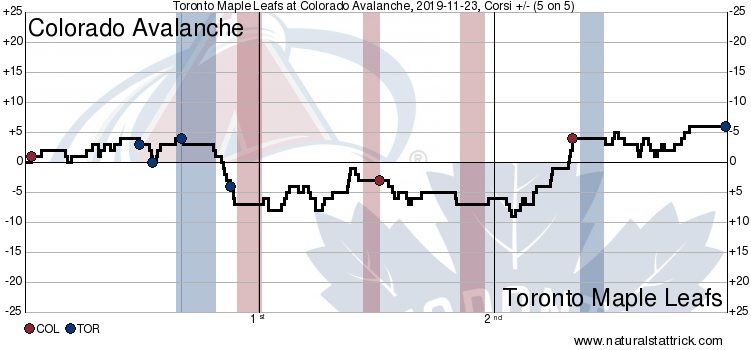
5v5 Shot Attempt Heat Map
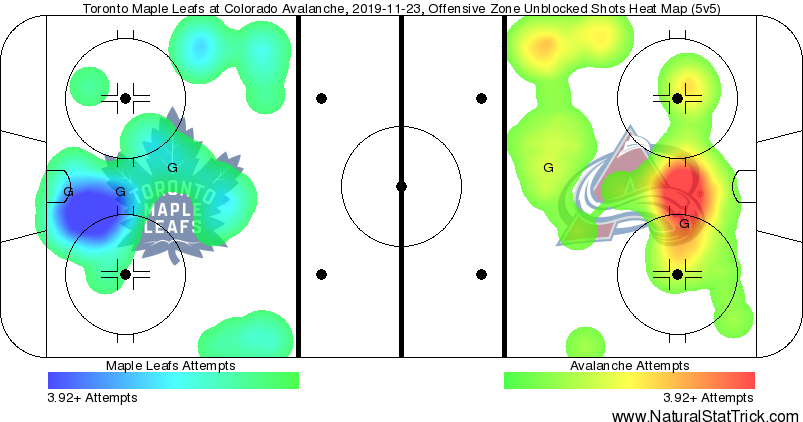














![John Gruden after the Leafs prospects’ 4-1 win over Montreal: “[Vyacheslav Peksa] looked really comfortable in the net… We wouldn’t have won without him” John Gruden, head coach of the Toronto Marlies](https://mapleleafshotstove.com/wp-content/uploads/2025/09/gruden-post-game-sep-14-218x150.jpg)







